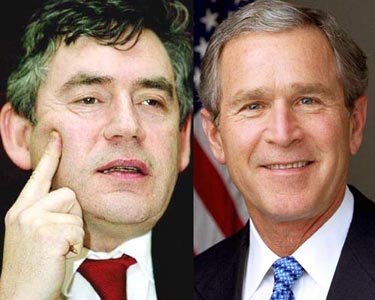George Bush, Gordon Brown tout "special" US-British friendship
Washington -  US President George W Bush and British Prime Minister Gordon Brown met at the White House Thursday hoping to put an end to speculation that relations between the two countries have weakened under the latter's tenure.
US President George W Bush and British Prime Minister Gordon Brown met at the White House Thursday hoping to put an end to speculation that relations between the two countries have weakened under the latter's tenure.
Seeking to dismiss those suggestions, Bush and Brown combined to use the words "special," "unique" or "great" or variations of them no less than a dozen times when describing the relationship at a press conference in the Rose Garden.
"This is a special relationship, not just of governments but of peoples," Brown said, even though he had also begun looking beyond Bush by meeting with the three presidential candidates hoping to become president in the November election.
"Our relationship is very special," Bush said. "There's just such a uniqueness in the relationship."
Bush also said he valued the personal friendship with Brown but stopped short of comparing it to the one he had with Tony Blair, the former prime minister who maintained a close relationship with the American president and strongly backed the decision to invade Iraq.
Blair's tight friendship with Bush and his support for the war in Iraq led the British public to dub him "Bush's poodle" and likely hastened his departure from office in June 2007, prompting many to believe Brown would seek a more distant relationship with the Bush White House.
There was reportedly tension between Washington and London over Brown's desire to further reduce the size of British forces leading the coalition's effort in southern Iraq - plans that were put on hold when violence erupted there last month.
But there were no signs of cracks in the relations in the Rose Garden as the two leaders demonstrated a clear consensus on tackling international challenges. Those included stopping Iran from developing dangerous nuclear technology, fighting terrorism, ending the conflict in Darfur and the political crisis in Zimbabwe.
They also promised to work together to counter climate change, combat poverty and disease and to take steps to shore up the shaky global economy.
Bush and Brown agreed that additional troop withdrawals in Iraq would not take place until the Iraqi government has made sufficient progress toward taking responsibility for security, with Brown pledging there will not be an "artificial timetable" for the end of Britain's role.
"Our role in training the Iraqis ... to assume more control of their own affairs is the way that we want to move from combat to overwatch in Iraq," Brown said.
Brown held separate meetings with Democratic presidential hopefuls Barack Obama and Hillary Clinton, who have outlined plans to initiate a gradual withdrawal of US forces from Iraq. Brown then met with presumptive Republican nominee John McCain, who has backed Bush's troop surge in Iraq and would likely stay the course.
The British embassy or campaigns did not provide details of the meetings, and Brown said he had no interest in weighing into the campaign.
"What I was convinced of, after talking to each of them and talking about the issues that concern them and concern the world, is that the relationship between America and Britain will remain strong."
The White House said Bush was not offended by Brown's decision to look beyond the end of Bush's term in January.
"It's probably a wise move by the prime minister to get to know who - one of the individuals who will likely be president in a year from now," spokesman Tony Fratto said. "So it makes sense." (dpa)